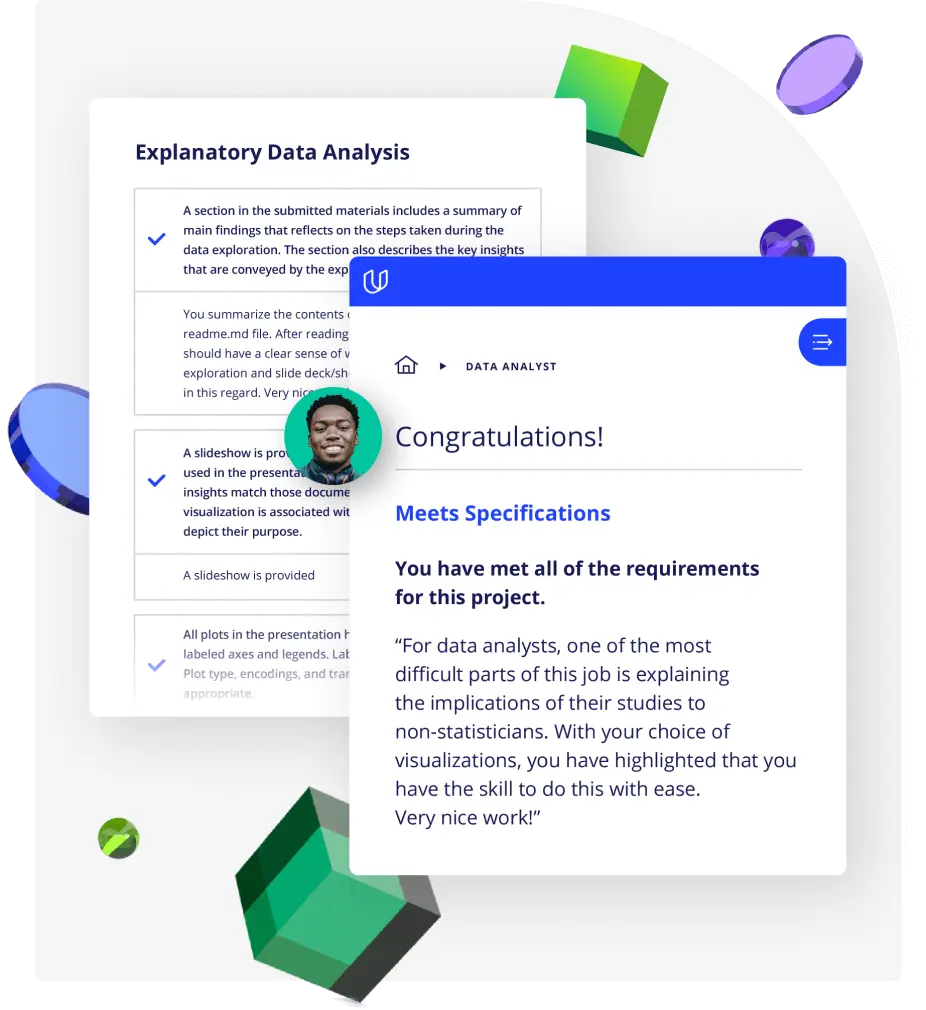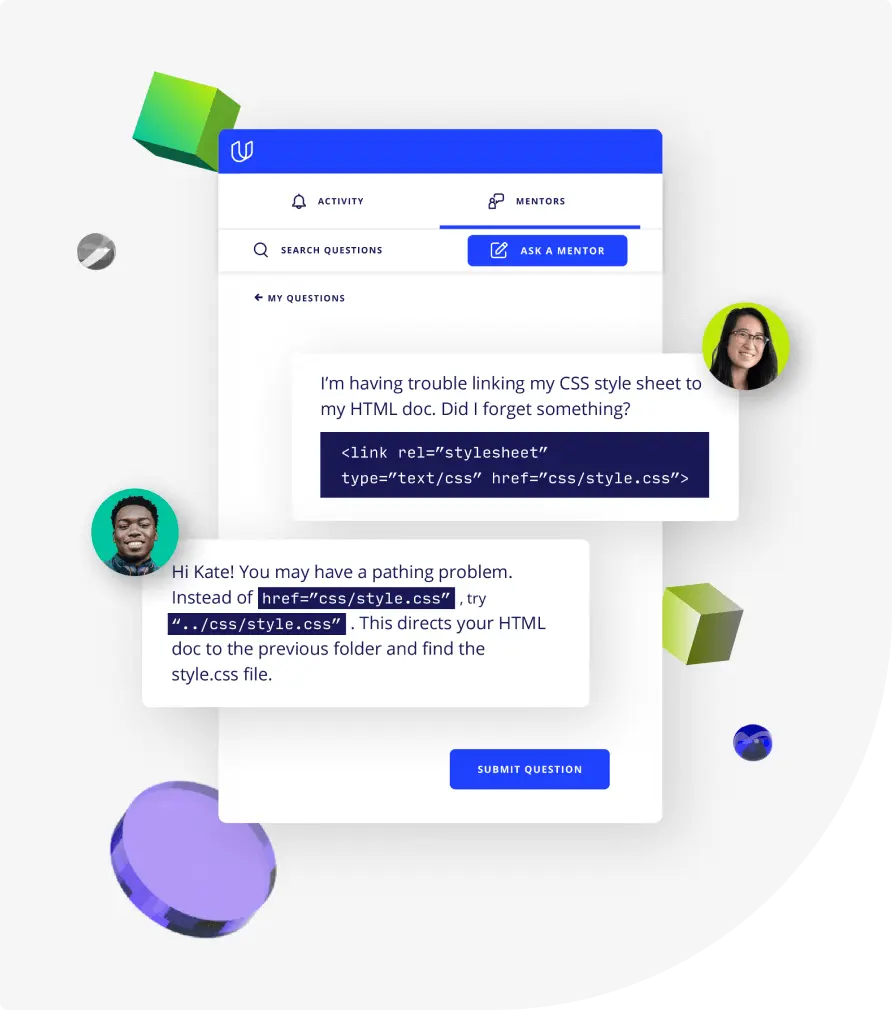Lesson 1
Cloud DevOps using Microsoft Azure Program Introduction
Welcome to the DevOps Engineer for Microsoft Azure Nanodegree program! In this lesson, you will learn more about the structure of the program and meet your instructors.

Nanodegree Program
This program teaches students how to deploy, test, and monitor cloud applications on Azure, thereby preparing learners for success on Microsoft’s AZ-400 DevOps Engineer Expert certification.
This program teaches students how to deploy, test, and monitor cloud applications on Azure, thereby preparing learners for success on Microsoft’s AZ-400 DevOps Engineer Expert certification.
Built in collaboration with
Microsoft
Intermediate
3 months
Real-world Projects
Completion Certificate
Last Updated July 25, 2024
Skills you'll learn:
Prerequisites:
Course 1 • 55 minutes
Welcome to Udacity! We're excited to share more about your nanodegree and start this journey with you! In this course, you will learn more about the pre-requisites, structure of the program, and getting started!
Lesson 1
Welcome to the DevOps Engineer for Microsoft Azure Nanodegree program! In this lesson, you will learn more about the structure of the program and meet your instructors.
Lesson 2
You are starting a challenging but rewarding journey! Take 5 minutes to read how to get help with projects and content.
Lesson 3
Instructions to set up an Azure Account for this program
Course 2 • 4 weeks
In modern deployments, automated deployment and management of cloud infrastructure is crucial for ensuring the high uptimes that customers expect. Understand the DevOps lifecycle and the basics of infrastructure management in Microsoft Azure. Learn about cloud security best practices to keep infrastructure secure. Leverage modern technologies to create robust and repeatable deployments in Microsoft Azure.
Lesson 1
In this lesson, we'll get an overview of the course and look at some of the fundamental concepts we need to understand why DevOps and infrastructure are so important.
Lesson 2
In this lesson we'll cover Azure infrastructure fundamentals, including IaaS resource types, deploying virtual machines, and virtual networking and load balancing.
Lesson 3
This lesson is all about Azure security, including using Azure Security Center, writing Azure security policies, configuring network security groups, and applying security best practices.
Lesson 4
In this lesson, we'll learn how to write Infrastructure as Code. We'll learn how to use Packer to deploy image templates, and how to use Terraform to deploy resources using infrastructure as code.
Lesson 5 • Project
In your final project, you'll create infrastructure as code—in the form of a Terraform template—in order to deploy a website with a load balancer.
Course 3 • 4 weeks
Automated Deployment of high quality software using DevOps principles is a critical skill in the cloud era. Master the theory and practice of Agile Project management with hands-on examples. Execute a Python centric Continuous Integration strategy that uses testing best practices, including open source code quality tools such as pylint and pytest. Couple Infrastructure-as-Code (IaC) with Continuous Delivery using Azure Pipelines to streamline the deployment of applications to Azure.
Lesson 1
In this lesson, we'll consider the underlying problems that Agile solves for and introduce you to some of the core concepts and tools underlying the Agile approach.
Lesson 2
In this lesson, we'll see how we can use an Agile approach to help ensure we're working on what matters—and avoiding typical problems that get in the way of software development.
Lesson 3
In this lesson, we'll look at how to use Azure to do Continuous Integration (CI). We'll walk through how to set up Azure Cloud Shell and evaluate different build server options.
Lesson 4
In this lesson, we'll look at how to leverage infrastructure automation in your development lifecycle so that we can achieve Continuous Delivery (CD).
Lesson 5 • Project
In your final project, you'll integrate an Azure Cloud Shell environment and use it to build, test, deploy, and operationalize a Machine Learning project. This project uses Flask and sklearn.
Course 4 • 4 weeks
Applications that have been built and released into the cloud need to be evaluated to ensure proper performance. Test cloud-based application performance and functionality within the pipeline itself, as well as after it has been deployed by using different types of test suites such as Selenium and Postman. Exercise those test suites against a variety of endpoints, including a sample eCommerce UI, and REST APIs. Build a systemic application monitoring process based on alert triggers in Azure Monitor and custom log files in Azure Log Analytics.
Lesson 1
Course Overview
Lesson 2
In this lesson, we will learn to use Terraform to deploy an Azure Resource and a CI/CD pipeline to execute an automated test.
Lesson 3
In this lesson, you will learn how to create a performance test suite and use JMeter to execute it.
Lesson 4
In this lesson you will learn how to use Selenium to write automated functional UI tests.
Lesson 5
In this lesson, you will learn how to use Postman to write automated integration tests.
Lesson 6
In this lesson, you will learn how to configure an alert on an Azure resource and configure Azure Log Analytics to ingest a custom log file.
Lesson 7 • Project
This is the end-of-course project, where you will have a chance to pull all the skills together as you would in the regular work of an Azure DevOps Engineer.

Principal AI Researcher
Erick Galinkin is a hacker and computer scientist, leading research at the intersection of security and artificial intelligence at Rapid7. He has spoken at numerous industry and academic conferences on topics ranging from malware development to game theory in security.

Founder of Pragmatic AI Labs
Noah Gift teaches and consults at top universities and companies globally, including Duke and Northwestern. His areas of expertise are Machine Learning, MLOps, A.I., Data Science, and Cloud Architecture. Noah has authored several bestselling books, including Python for DevOps.

DevOps Engineer, Goodyear Tire & Rubber Company
Nathan has worked on implementing DevOps solutions for the past 8 years across the financial, educational, logistics, and manufacturing industries.
Average Rating: 4.3 Stars
62 Reviews
Mohamed B.
April 18, 2022
Well implemented program
Anonymous
April 5, 2022
it's going very well, it's challenging enough to learn a lot
Gabriele F.
March 21, 2022
Well selected and well explained content!
Claudianor J.
November 6, 2021
Udacity's program is incredible and I'm really linking it, but in the project i had some difficulties because there were some requirements that I haven't learned, then I had to search it on Google e Forums and read the Terraform documentation to finish my project. I think it's not supposed to be like that, I wanna learn it with Udacity.
Maksim G.
October 21, 2021
I got some great feedback and help from the reviewers
Combine technology training for employees with industry experts, mentors, and projects, for critical thinking that pushes innovation. Our proven upskilling system goes after success—relentlessly.

Demonstrate proficiency with practical projects
Projects are based on real-world scenarios and challenges, allowing you to apply the skills you learn to practical situations, while giving you real hands-on experience.
Gain proven experience
Retain knowledge longer
Apply new skills immediately

Top-tier services to ensure learner success
Reviewers provide timely and constructive feedback on your project submissions, highlighting areas of improvement and offering practical tips to enhance your work.
Get help from subject matter experts
Learn industry best practices
Gain valuable insights and improve your skills

Unlimited access to our top-rated courses
Real-world projects
Personalized project reviews
Program certificates
Proven career outcomes
Full Catalog Access
One subscription opens up this course and our entire catalog of projects and skills.
Average time to complete a Nanodegree program
(416)
4 months
, Intermediate
(398)
3 months
, Intermediate
(34)
4 months
, Intermediate
(4)
3 months
, Advanced
(174)
2 months
, Advanced
(2)
4 months
, Advanced
4 weeks
, Advanced
(67)
3 months
, Intermediate
(47)
4 months
, Intermediate
4 weeks
, Intermediate
4 weeks
, Intermediate
(87)
4 months
, Advanced
(13)
4 weeks
, Beginner
4 weeks
, Intermediate
4 weeks
, Intermediate
4 weeks
, Intermediate

Cloud DevOps using Microsoft Azure
(416)
4 months
, Intermediate
(398)
3 months
, Intermediate
(34)
4 months
, Intermediate
(4)
3 months
, Advanced
(174)
2 months
, Advanced
(2)
4 months
, Advanced
4 weeks
, Advanced
(67)
3 months
, Intermediate
(47)
4 months
, Intermediate
4 weeks
, Intermediate
4 weeks
, Intermediate
(87)
4 months
, Advanced
(13)
4 weeks
, Beginner
4 weeks
, Intermediate
4 weeks
, Intermediate
4 weeks
, Intermediate